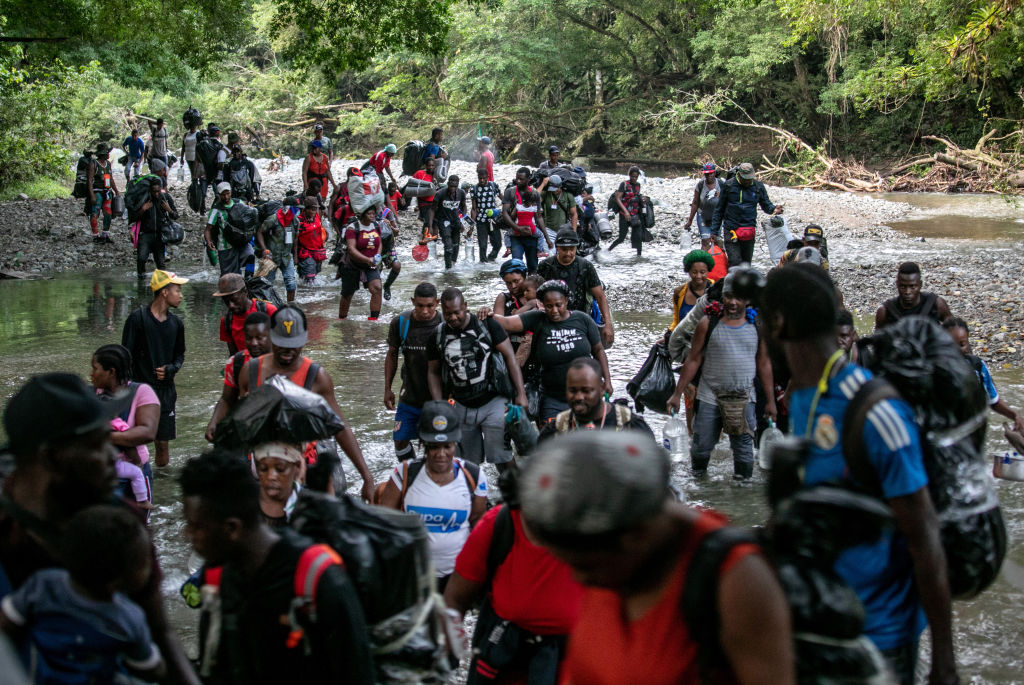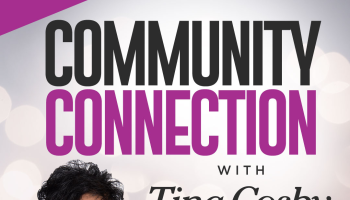
Migrants, most from Haiti, ford one of many rivers they will cross while on a trek through the infamous Darien Gap on their journey towards the United States on October 7, 2021, near Acandi, Colombia. | Source: John Moore / Getty
When President Joe Biden lobbied the Haitian community during his campaign, the overwhelming sentiment was, given the options, he would be a defender of immigrants in a country that under the Trump administration, quickly turned its nose up to those seeking a better life for themselves in the United States. Trump’s words referring to Haiti as a “shithole” country echoed in town halls and WhatsApp groups discussing the latest election and whether support for Biden would help or harm the community.
After all, America has a pattern of “otherizing” groups when convenient, and given Haiti’s relationship with the U.S. historically, Haitian voters wanted to guard against that. However, to the surprise of many, support for Biden didn’t translate into safeguarding Black asylum seekers from the throes of American ethnocentrism, racism and bigotry. Instead, it catapulted them to the center of it, followed by a one-way ticket “home.”
MORE: Dictatorship Masked As Democracy: A Timeline Of The 1915 U.S Invasion And Occupation Of Haiti
Biden promised to diverge from the immigration policies of the 45th president. In October 2019, then-candidate Biden decried then President Trump’s “abandoning [of] the Haitian people” in a tweet following months of political infighting and gang violence that rendered the country nearly inhabitable.
So where is that president now? Haiti is still reeling from political chaos—made worse by political assassinations, earthquakes and hurricanes—yet asylum seekers are largely ignored.
We see preferential policies where power has determined one group of immigrants is not as important (or even as human) as another. There was an expectation that Biden’s policy would be more proactively accountable to the events of the world, but that is clearly not the case. Haitians have been largely abandoned at the worst possible moment, while the Biden administrations’ policies have been reactive at best—yet that would still be overly generous.
Despite the disappointment, this is not new for America’s relationship with Haiti. The first free Black republic of the modern world has had a troubled paternalistic relationship with the waning superpower since its foundation.
Inspired by the rhetoric of the American and French revolutions, Haitians assumed the new government would support their country’s political liberation. However, the United States instead stood firm against the Black republic, aligning itself with European power in an effective attempt to destabilize Haiti and show the world the might of white supremacy.
We’ve seen different manifestations of this exercise of perpetuating white supremacy, century-after-century, decade-after-decade. Fast forward to 2021, and Haitians continue to be discriminated against and treated worse than their fellow Caribbeans and Latin American counterparts.
Take, for instance, America’s relationship with Cuba, another country close to both Haiti and the United States. Mired with half a century of political difference with the U.S., Cubans fleeing communism as political and economic refugees have been invited with open arms. However, when Haitian asylum seekers have sought the same reprieve, they have been shown the heavy hand of the American government.
If that sounds radical, consider what’s happening right now from a global perspective with Afghan refugees and asylum seekers. Moving on from our colonization and twenty-year occupation of Afghanistan, Americans are begrudgingly accepting asylum seekers as an unspoken concession of defeat (one of many messes America created around the globe in the last 20 years) by leveraging public resources, the business community, international NGOs and a network of American nonprofits to help war-tarnished Afghans escape the oppression of the Taliban. Upon arrival, many of these refugees and asylum seekers are met with social assistance, including housing from private corporations like AirBnB looking to contribute back to the global community.

United States Border Patrol agents on horseback try to stop Haitian migrants from entering an encampment on the banks of the Rio Grande near the Acuna Del Rio International Bridge in Del Rio, Texas, on September 19, 2021. | Source: PAUL RATJE / Getty
Now, take the myriad of destructive events besieging the innocent people of Haiti: earthquakes, the assassination of a president, a lack of resources, all leading to violence in the streets and a need to seek asylum. Besides the crisis they are escaping, what is the fundamental difference here? Supporting one group is politically fashionable and another is not.
Perhaps most egregious has been the inconsistent approach between those from Haiti who are already here and those trying to come for the same reason: domestic destabilization. The United States government chose to extend temporary protective status (TPS) of Haitian asylum seekers already in the country, but as this crisis has evolved and more people have sought entry from Haiti, the U.S. government has failed to act. The direct, glaring contradiction highlights the need to re-evaluate how immigration policy decisions are made.
There is an opportunity for the United States federal government to act and treat all asylum seekers humanely. We need to move beyond a time when our government, NGOs, nonprofits and others have the privilege to decide whether one group takes precedence over another. This is a country established on the freedoms and promise of a better life. The Biden administration and future governments must equalize their approach to asylum seekers and treat all seeking refuge in this land of immigrants humanely and with respect in order to undermine the supremacist thinking America has battled since its inception.
Erica Dumas, Haitian-American, National PR Strategist
Vania Andre, Haitian-American, The Haitian Times, Board Chair
SEE ALSO:
Data Shows U.S. Grants Asylum To Haitians Less Than Any Other Nationality
Right-Wing Support For Border Patrol Grows After Agents Whip Haitian Migrants With Horse Reins
Haitian Asylum Seekers: Biden Administration Backpedaling On Promise To Reverse Trump’s Cruel Immigration Inhumanity was originally published on newsone.com















